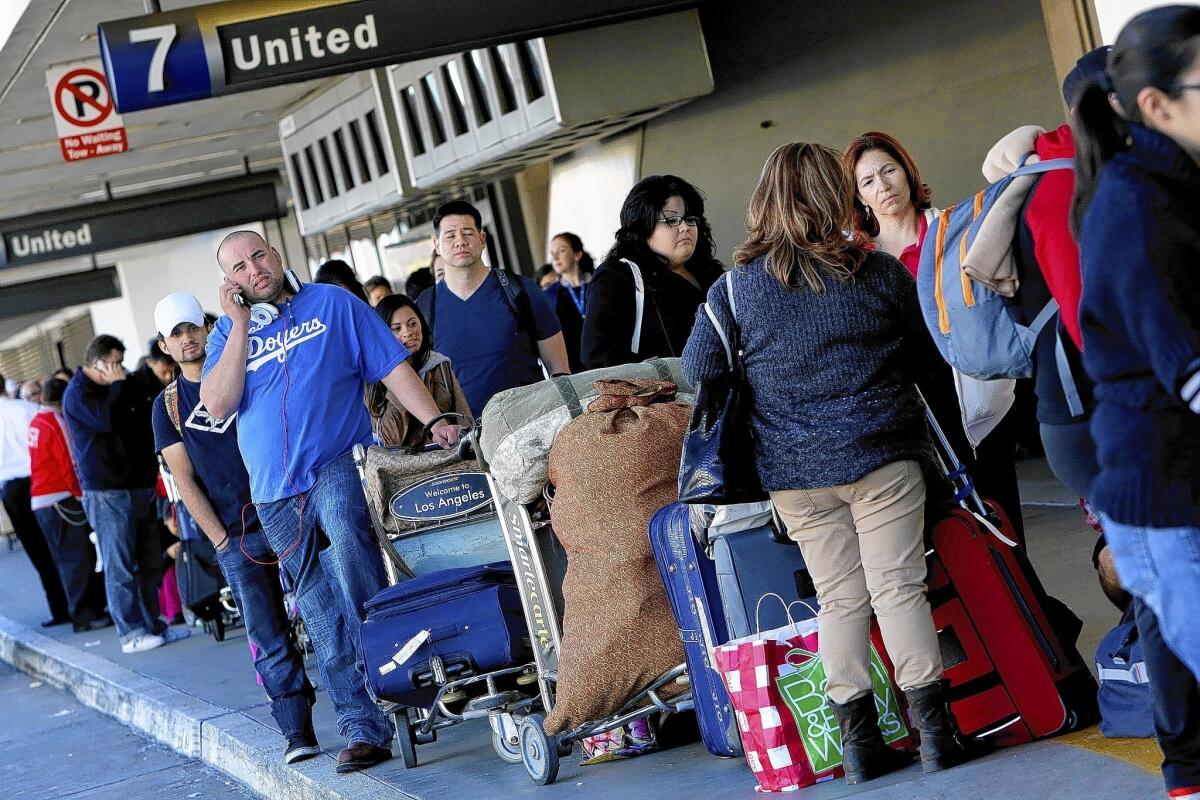Airlines lower fares to offset bag fees, but still make a profit

- Share via
Travelers protested when airlines began charging bag fees in 2008, saying the extra charge was a blatant money grab.
But a new study concludes that the nation’s airlines quietly lowered airfares slightly to make the bag fees more palatable to those fliers who would get stuck paying the new charge.
Still the airlines are profiting because the drop in fares was so small it did not totally offset the added cost of checking a bag, the study found.
“The fact that the airlines are doing it must mean they are coming out ahead,” said Jan Brueckner, an economics professor at UC Irvine who co-wrote the study with other economics experts.
The study will appear later this year in the Journal of Economics and Management Strategy.
A trade group that represents the nation’s airlines did not dispute Brueckner’s theory, saying fares are lower now that airlines are charging fees for extra services such as checking bags.
The nation’s major airlines began to adopt checked-bag fees about six years ago when a spike in fuel costs and the country’s financial crisis squeezed the airline industry’s already-thin profit margin.
Bag fees started at $15 a bag and grew to about $25 each. In the first nine months of 2013, the nation’s airlines collected $2.5 billion in bag fees, according to federal statistics.
When the airlines added the bag fee, they faced downward price pressure — the resistance of budget-minded travelers to pay more, the study said. In response, airlines dropped fares slightly, by about $7 for most lower-priced tickets, according to the study.
The airlines did not lower fares for first-class and business-class fliers who are usually exempt from bag fees, the study concluded. But for travelers who do pay the extra cost, Brueckner’s study found the drop in fares offset only about half to one-third of the cost of the added fee.
Travelers seem to support United’s crackdown on stuffed carry-ons
The addition of airline bag fees several years ago created another travel annoyance: people who cram all their travel necessities into carry-on bags to avoid the fees.
United Airlines recently began a crackdown on those passengers. And it seems that many fliers agree with United.
Nearly half of recent fliers who were questioned said they support United’s crackdown, according to an online survey of more than 1,000 adults, conducted by London research company YouGov.
In fact, 44% of people who have flown in the last year said passengers carry too much onto planes, making life miserable for other fliers, the survey found.
But the survey aims some criticism at the airlines as well.
Half of recent fliers said oversized carry-ons wouldn’t be a problem if airlines didn’t charge so much for checked-bags.
First- and business-class get even more cushy
More and more air travelers are buying expensive first-class and business-class seats, and airlines are coming up with some creative amenities to keep those big spenders happy.
That includes scented pillows and chauffeured SUVs.
The number of passengers buying expensive premium seats jumped 4% in 2013 and continued to grow thanks to improved business conditions around the world, according to the International Air Transport Assn., the trade group for the world’s airlines.
To serve well-heeled travelers, United Airlines recently announced it is expanding a service that takes elite fliers straight from one plane to a connecting flight in chauffeured Mercedes-Benz SUV.
The service that has been offered at airports in Chicago, Houston and New Jersey will be expanded this spring to San Francisco International Airport.
Meanwhile, Etihad Airways, the national airline of the United Arab Emirates, has launched a program to improve sleep for long-haul fliers. It offers mood lighting, hot chocolate and herbal teas, noise-canceling headphones and pillows spritzed with lavender and camomile.
More to Read
Inside the business of entertainment
The Wide Shot brings you news, analysis and insights on everything from streaming wars to production — and what it all means for the future.
You may occasionally receive promotional content from the Los Angeles Times.










